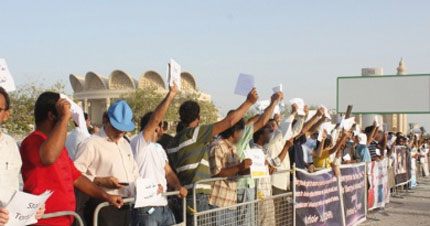
|
 |
 |
|
|
|
|
|
|
|
|
|
|
|
|
|
|
|
|
|
|
|
|
|
|
Bahrain in the International Day
|
 |
Leaving the past behind and forgetting the pain is not only possible but necessary, so that it does not dictate the present or hinder the State and society’s future. For this to happen, the effects of the past period must first be addressed, and this has not yet taken place despite constant attempts. However, there is a hope that the file will eventually be solved, despite the delays and some attempts to use the issue for political gains. The NIHR could have a role in this regard, in the near future.
Bahrain celebrated the 26 June 2010 with a protest in Manama near Al Fateh Mosque, in which human rights and political societies participated as well as MPs. The protestors held the photographs of some victims and banners condemning torture and demanding justice for the victims. At the end of the protest, a statement was issued in which the protestors stressed on keeping the file of victims of torture open until steps are taken to put an end to the suffering of victims and their families.
But why has the file not yet been closed? Why do calls for closure arise only on special occasions? And why are public and political initiatives to achieve this are absent?
This issue from the pre-reform period has not been solved for several reasons, including:
Firstly: the issue is now in the hands of political societies, rather than human rights bodies. Hence it has been dealt with in a political sprit, to the extent that the issue now resembles a conflict between politicians, in which they attempt to score points against each other.
Secondly: the problem of trust between participants in the political game has expanded, which has led to the failure of several initiatives to solve the problem. This is further complicated by the political opposition’s refusal to accept only financial compensation for the victims; rather it sought political concessions aimed at embarrassing the Government, rather than cooperating with it. The local political atmosphere did not help to achieve such concessions.
Thirdly: there are violent political parties whose interests do not lie in the closure of this file, and are also currently dictating the file of victims of torture, and refusing any proposals for settlements. These parties raised their demands to calling for the complete annulment of the political process, and the overthrow of the political regime. The torture victims’ file was just an excuse to achieve this objective. On the other hand, the continued violence has created doubts in the Government, pushed it to adopt extreme positions, and made it deny sole responsibility for the case.
Fourthly: psychologically, many are unable (or unwilling) to admit the truth, for there have been breaches by both parties, the Government and the opposition, resulting in the loss of many innocent lives. If the Government’s responsibility is larger in this regard, then the opposition itself does not seem ready to admit their share, and wants the Government to bear the responsibility for the whole issue.